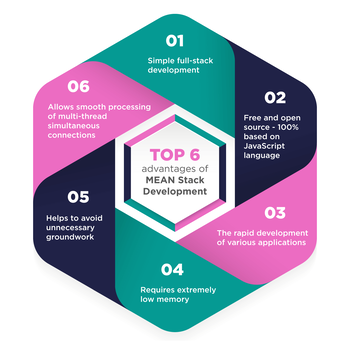MEAN Stack Development
MEAN stack development is a powerful and versatile approach to building web applications that leverage the entire JavaScript technology stack. MEAN stands for MongoDB, Express.js, AngularJS, and Node.js, which collectively offer a full-stack solution for creating dynamic and scalable web applications. Let's explore the key components and benefits of MEAN stack development.
MEAN stack development offers a comprehensive and cohesive approach to building modern web applications with JavaScript. Developers can create feature-rich, scalable, and real-time applications that deliver exceptional user experiences. As a leading web development agency, we excel in MEAN stack development, delivering cutting-edge solutions that propel businesses to success in the digital landscape.
- + MongoDB - Flexible and Scalable Database:
- + Express.js - Lightweight Web Application Framework:
- + AngularJS - Front-End JavaScript Framework
- + Node.js - Scalable Server-Side Runtime Environment
- + End-to-End JavaScript
- + Rapid Prototyping and Development


MEAN Stack Development: Empowering Modern Web Applications with JavaScript

MongoDB is a NoSQL database that stores data in a JSON-like format called BSON
(Binary JSON). It offers great flexibility in data structure, making it suitable for
agile development and easy integration with the rest of the MEAN stack. Its scalable
architecture allows for efficient handling of large volumes of data.
Express.js
is a minimalistic and flexible web application framework for Node.js. It simplifies
the process of building robust server-side applications by providing a set of
essential features, including routing, middleware support, and request handling.
Express.js enables rapid development and seamless integration with other components
of the MEAN stack.
AngularJS is a powerful front-end JavaScript framework maintained by Google. It
allows developers to create dynamic and interactive user interfaces, making it ideal
for building Single Page Applications (SPAs). AngularJS offers features like data
binding, dependency injection, and custom directives, enhancing the overall user
experience.
Node.js is a server-side JavaScript runtime built on Chrome's V8
JavaScript engine. It enables developers to create high-performance and scalable
applications by utilizing non-blocking, event-driven I/O operations. Node.js excels
in handling real-time applications and concurrent connections, making it a perfect
match for modern web development.

FAQs of Mean Stack Development
MEAN Stack Development is a web development approach that combines four open-source technologies: MongoDB, Express.js, AngularJS, and Node.js. Together, these technologies enable full-stack development using JavaScript for both the front-end and back-end, providing a cohesive and efficient solution for building modern web applications.
The MEAN stack consists of four main components:
MongoDB: A NoSQL database that stores data in a flexible
JSON-like format.
Express.js: A lightweight and flexible web application framework
for Node.js.
AngularJS: A front-end JavaScript framework that enables the
creation of dynamic and interactive user interfaces.
Node.js: A server-side JavaScript runtime that allows developers
to build scalable and high-performance applications.
Using the MEAN stack offers several advantages, including:
1: A unified JavaScript codebase for both client-side and
server-side development, streamlining the development
process.
2: Real-time capabilities for building interactive and
responsive
applications.
3: Flexibility and modularity, allowing easy scaling and
adaptation
to changing project requirements.
4: Rapid prototyping and development, reducing time-to-market
for
web applications.
5: Cloud-friendliness and ease of deployment on various cloud
platforms.
While MongoDB is the default choice for the MEAN stack due to its JSON-like structure and scalability, the stack is not limited to MongoDB. Developers can choose other databases like MySQL or PostgreSQL based on the specific needs and requirements of the project.
Yes, the MEAN stack is well-suited for large-scale and complex applications. Its components, especially Node.js, are designed to handle high traffic and concurrent connections, making it an excellent choice for demanding applications.











